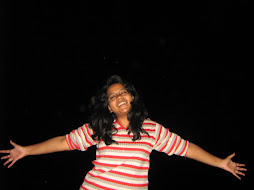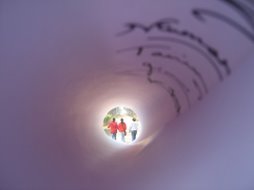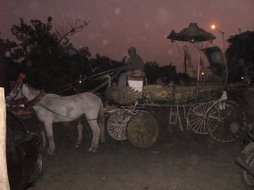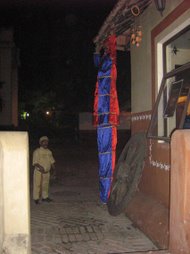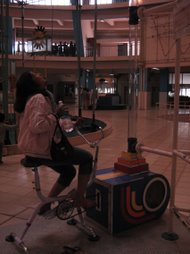This is a long overdue tribute to the only elder sister I have known or will ever know. It is in first person narrative. I wanted to keep myself out of the narrative as far as was humanely possible. Chechi was one of the inexplicale highs of my life. Why it is that God chose to bless me so still remains beyond my grasp, but like summer rains and starry skies, I would rather be grateful than try to find a reason for such benevolence.
With all my love, for Nikhi chechi....
Ee kabani pole njanum…(I too am like the Kabani)
As long as I remember, my journey from childhood through girlhood, womanhood and now, what I hope is a long and fruitful motherhood was always like the flow of the Kabani, the flow of my thought always an exception to set norms and conventions. It was never done intentionally. Like the flow of the river, I believe it just happened. The other direction was mine, always. It seemed ironic, when in my 23rd spring, I was initiated into the activities of KABANI, an NGO dedicated to shatter every pre-existing notion of tourism and regular work ethics. For all I know the Kabani is an extension of my self.
My parents never practiced any conventional religion at our home. I was free from the fetters of religious belief and rituals at the very outset. Even today, as my friends call the name of the elephant God Ganapati as they enter an examination hall, I just remember the people I love or rather the love that I bear them. I do not deny the right of people to believe in God, rather having never had any systematic belief system to rely on, I had to develop my own and this is the system that convinces me most. The beauty of the here and now overwhelms me, without the need of a supreme being to create moments, solely mine.
I have always been interested in the creative arts. Dance was my principal interest but the amount of training and investment required scared the high-school Nikki. I regret it now and I realize more fully what it means when people say that when you look back at life what you regret most is the stuff you did not do, rather than what you did.
Later on I took up Drama and spent a considerable part of my youth traveling with a troupe of artistes. Besides the thrill of traveling across the state to perform, what I remember most of the experience would be the feeling of a duality of existence that permeated it. I was the youngest member of the group, the others being working men, mainly teachers, housewives and some others. Outside of the stage I was their baby, their child, pampered to the hilt, and then suddenly, on stage, I am a wife to one, nurse to the other, lover to a third. The change in perspective reveals parts of you, you never knew about, never knew even existed. And then, those rare moments, when you completely forget yourself and identify with the character, heady, euphoric, the realization of the truth of heaven on earth. I particularly remember “Karkidagam”, a play where I play two roles. Basically, the story revolves around the inmates of two adjacent cells in a mental asylum. The first is a woman who is forced to kill her husband after he repeatedly abuses her. The second is a young man who determines to kill his lover and then himself, as they are of two different castes and therefore, society does not allow them a future together. However, he survives the attempt. I appear as the woman, normally with a red hibiscus behind her ear, perpetually waiting for her deceased husband. And occasionally I appear as a hallucination that the young man has of his lost love. He keeps telling her that he loved her so and was looking forward to a life together; and she replies sobbing,” Then why my Darling did you kill me?” There was a point in the performance I forgot the reality of the play and I could have sworn that I was her. So deeply did I feel the sorrow of my death, my appearance in front of my lover as nothing more but a hallucination. Later in the play, we see the two inmates holding hands through the bars of the cell and smiling peacefully while across the bars, outside the cells, on the other side, we observe the tension between the warden of the institution and its chief Doctor building to a final climax. They quarrel vociferously and for a moment we feel that they are in the cells and the inmates outside. It questions in one stroke the definition of sanity, reality and the unity of the human soul. For me, it meant that the moment in the play when I identified with the boy’s lover, I was really her, at that moment she was more real than Nikhila Vijay. Later, when I came to BIT to do my M.Sc in Biomedical Instrumentation, in order to relive the experience of the play, while ragging my juniors, I forced one of them to re-enact the female inhabitant of the asylum, hibiscus flower et al. She did as I said but burst out crying later. I was hurt too. I felt terribly ashamed of myself. I who professed the power and strength of the individual and his freedom to act on his own convictions was trying to subjugate the ego of another. How could I! I felt I had betrayed myself. Later when all my batch mates had fallen asleep, I went to console her and she went on to become my favourite junior. This is the true spirit of great art. It never stops working magic in your life.
BIT was a phase of my life that forced me to leave most of my Art behind. However, this place gave me exposure to a world of people outside my little Kerala, two years of peace and tranquility in the virgin environment of the campus and an Elema (Aunty/Mausi) for my 2 year old. The only thing I hold against my Soni mol, would be her total anti-Kerala stand, while I was there. I believe that when you are outside a system you must not complain about or criticize it. Inside the system however, you may and must raise your voice, as that is the only way to affect a positive change. I understand you love your “Malluland”, as you call it, in this weird, cranky way of yours, but while you are at BIT, I was hoping you would express that love in more clearly decipherable terms.
Shortly after my sojourn at BIT, I moved in with my fiancé of nearly 4 years, Suman(Sumesh Mangalassery), in Bangalore. I was an intern at Wipro GE for six months. It was then that I realized that Biomedical Instrumentation had severely narrowed my scope. I wish to tell all of you youngsters out there to specialize in something only when you are totally sure of yourself, never as an escape from something else. Specialization increases your expertise in a particular field but it means narrowing down your overall scope. Normally (at least in the Indian system), there is no going back. I also realized that these high-end jobs at MNCs feed your ego unnecessarily, stripping you of your humility. You lead a dissipated life, spending in excess of your means; and when you are truly in crisis, your shabby, new-born superiority complex makes you too proud to ask for what you really need. Whatever our job or our pay, what we need to live never changes, what we love never changes, the only variable is the level of comfort, and there is such a thing as getting too comfortable.
When I look back on this phase, I feel more than ever blessed to be the daughter of my parents and Nikhimol of Suman. In Kerala, live-in relationships are generally looked down upon. Even now my eyes get moist remembering how my parents trusted me in spite of what everyone else thought. That is the thing about trust. It is one of the most solid investments you can make. Once invested, the other party can never break it. The trust becomes sacred, becomes binding.
Around this time, Suman left his job at Equations and started KABANI. The name was inspired by a river in Wyanad, our home-town. There are three rivers that run through the district. While two of the rivers flow in one direction, Kabani flows the other way. When he conceptualized it, Suman visualized a work-space where people could come and go according to their convenience, voluntarily or on a pay-for-hire basis, flexible working hours, flexible working styles. It was to be a tourism NGO which would allow native populations to benefit from the recent influx of tourists in Kerala.
When we started out, we really struggled. I remember how, when we used to walk through the streets of Bangalore, trying to arrange finances for KABANI, I would feel hungry around noon. I knew that Suman did not have more than 50 Rs. in his pocket, and then there was the question of getting back home. My Wipro stipend was consumed in normal household expenses. With those 50 Rs we faced the challenge of feeding ourselves in a city like Bangalore. We would choose the cheapest looking restaurant in the vicinity. Both of us would glance quickly at the menu card and fix our eyes on the only item that fitted our budget, curd rice at 20 Rs. I would remark, “A plate of curd rice would be nice. I love curd rice so.” He would reply, “Yes, curd rice is good for the stomach. Curd rice it is.” It went on for countless days, both of us craving to eat something else, both of our eyes wandering up and down the menu, I wishing desperately that at least today we may have a decent meal, him feeling both ashamed and helpless at his inability to provide it, both of us finally fixing on the same line, Curd rice………20 Rs. If I had complained once, he could not have gone through with his grand plan. It is surprising to think how little it takes for a dream to crash, crumble, fall…..wither away.
KABANI has come a long way since. Even yesterday when he called home from Germany, he asked me, “Do you remember our old curd rice?” I replied that I did and wished to know why he posed the question. It was a long time ago. He said that no matter how much we grow, it is good to remember where we came from.
Let me fill in the blanks between long ago and now. I got married to Suman two winters ago. We have a little girl, we call Aamy, who is now a year old.
When I look back, what really strikes me is that the instant Aamy was born, I and Suman had not turned into this pair of Johnsons baby parents. It was only later, that we started to appreciate the miracle that had been entrusted in our care. The first time she opened her eyes, when she started swimming around in her swaddling clothes, then crawling on all fours, wet kisses…..Her first word was not Ma but rather kaka, Malayalam for crow. For me it was not the word, it was that she said it. She makes me want to be better every day for her sake. So that she may see in me something worthy of emulation. Eons ago, so it seems, Nikhila Vijay gave up on dancing. She was intimidated, scared, worried, she gave up. In the present day, Aamy’s mother attends dancing classes at Tara Kalyan’s in Trivandrum, while Aamy watches and dances along as she sees fit. Aamy’s mother cannot afford to be intimidated, cannot afford to give up. As I do a bit of abhinaya, Amy looks at me and is amused. A spontaneous blessing rises in my mind, “May you flow forever like the Kabani.”
Sunday, November 25, 2007
Subscribe to:
Posts (Atom)




.jpg)
.jpg)
